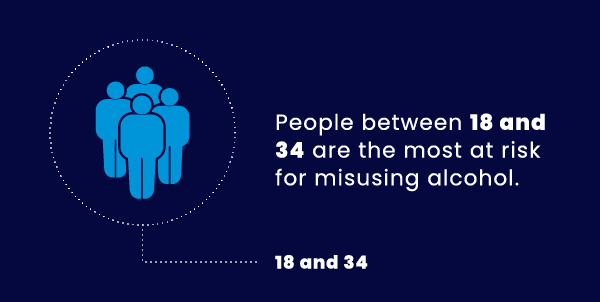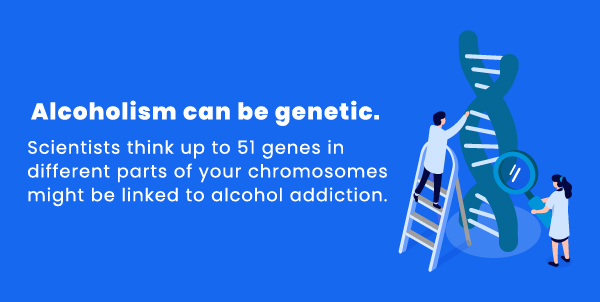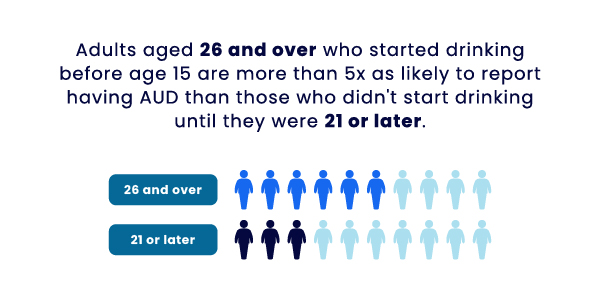Alcoholism Symptoms: Causes and Treatment
If you think you may be experiencing alcoholism symptoms, reaching out for help from a treatment center can help you heal and develop coping skills.
Overview of Alcoholism
Have you ever thought about how alcoholism affects people’s lives? The Centers for Disease Control (CDC) notes overconsumption of alcohol causes up to 95,000 deaths in the US every year. Alcohol is one of the country’s top causes of preventable death. Alcoholism symptoms can also cause harm over time to those with substance abuse disorders.1

Scope of Alcoholism
Men are more likely to develop an alcohol substance abuse disorder than women are. Also, people between 18 and 34 tend to struggle with alcohol more than other age groups. However, alcoholism is a disease that can impact anyone. Even though alcohol can cause serious problems, it is still a widespread societal and recreational substance. This can lead to chronic physical health issues and may even harm personal relationships.
Drinking too much alcohol can also be expensive. Alcohol abuse costs the US billions of dollars annually in lost productivity and extra healthcare expenses. It’s not just lost wages, either. People can also face legal fees and fines for crimes committed while under the influence of alcohol.2
What is Alcoholism?
How Much Alcohol Is Too Much?
Assessing Your Alcohol Consumption
You can also gauge your drinking habits by observing how much you consume during an average week. For women, taking more than seven drinks per week or more than three drinks daily is considered “heavy” or “at risk” drinking. For men, it’s more than 14 drinks in a week or more than four drinks daily. It’s important to be mindful of how much you drink to help avoid alcoholism symptoms later on.
What Are Common Alcoholism Symptoms?
Alcoholism symptoms can vary from person to person. They also range from mild to severe. It’s important to keep track of any symptoms you or a loved one may be experiencing to know if you need to take steps to address these symptoms later on.
Physical Symptoms
- Short-Term Symptoms: Short-term symptoms may include slurred speech, poor coordination, slow reaction times, blurry vision, alcohol poisoning, and hangovers.
- Long-Term Symptoms: Long-term alcoholism can lead to malnutrition, liver damage, brain damage (especially in teens), anemia, and seizures. It can also cause high blood pressure, an increased risk of heart attack or stroke, and an increased risk of cancer. For those who have battled alcoholism for a long time, they may also have issues with sexual dysfunction, gout, dementia, a weakened immune system, and osteoporosis.
Behavioral Symptoms
- Short-Term Symptoms: You may experience short-term symptoms like increased risk-taking, aggressive or belligerent behaviors, reckless driving, or engaging in risky sex.
- Long-Term Symptoms: Long-term symptoms can affect your social life, like isolating yourself from loved ones, struggling to keep up with work or school responsibilities, and withdrawing from friends and family. You may also be secretive, stop doing things you used to enjoy, or drink before situations that make you anxious.

Mental and Emotional Alcoholism Symptoms
Due to what alcohol does to the brain and body, it can cause mental and emotional signs of alcoholism. Alcohol has the potential to affect your mood and lead to erratic behavior as well. When you drink, the chemicals in your brain become out of balance, leading to these mental and emotional alcoholism symptoms. These problems can happen right away or over time.
In the short-term, alcohol can make you angry, irritable, and forgetful. It may even make you lose consciousness. Over time, you may need more alcohol to feel the effects as you once did. This is called building tolerance. At the tolerance level, you may not be able to pay attention to important matters as well as you used to. You may also struggle with intense cravings.
Long-Term Mental Health Symptoms of Alcoholism
- Chronic anxiety
- Severe depression
- Aggression and irritability
- Insomnia
- Paranoia
- Reduced self-esteem
- Inability to focus

Other Alcoholism Symptoms
Alcohol abuse can be problematic for not only the person abusing alcohol, but their loved ones around them as well. One such example is that drinking alcohol while pregnant runs the risk of harming the unborn child. The baby may be born with brain damage, develop problems with growth, have delays in development, and have issues with balance and coordination.
There is no treatment for pregnancy-related alcoholism, as even a tiny amount can cause serious problems. This is why it’s especially important for pregnant women to seek out help if they’re experiencing alcoholism symptoms.
Dangers of Withdrawal
A Deeper Look at Delirium Tremens (DTs)

How Alcoholism Can Negatively Impact Your Wellness
Alcoholism can hurt various facets of your life, especially if it develops into an alcohol substance abuse disorder. Even if you think you may have your drinking under control, it can affect various areas of your life more than you may think. The following are some potentially affected areas:
Social Life
Your relationships with your friends, family, coworkers, and loved ones can suffer from alcoholism. Alcoholism symptoms, over time, can make you feel socially isolated and cut off from the people you care about, which often exacerbates the situation.
Financial Stability
Alcohol symptoms and abuse may be pretty costly and can result in financial issues. You might overspend on alcohol or miss work due to drinking. This can result in a loss of employment, making it even more difficult to pay for essentials like food and rent.
Emotional Health
Alcoholism symptoms can affect your mental health and lead to emotional problems, such as depression and anxiety. If you drink too much, you can become irritated or have mood fluctuations as well.
Physical Well-Being
What Are Some Causes & Risk Factors of Alcoholism Symptoms?
Biological Factors
Frequent Drinking
Mental Health Issues
Emotional Issues
Problems with one’s self-esteem are another factor that might lead to alcoholism. It’s more common for people who have poor self-esteem to resort to alcohol as a means of dealing with any negative feelings they have about themselves. This can cause emotional pain and stress. It may seem like a good approach to dismiss these feelings by drinking more often, but this is not a healthy method to deal with difficult situations. It can lead to addiction and dependence on alcohol.
Starting to Drink Early in Life
Familial Factors
Your family dramatically impacts how much and how often you drink, which is a big part of how you act. If your parents or other close relatives drink a lot of alcohol or try to get you to drink, you are more likely to struggle with alcoholism symptoms later on in life. This is especially true if you grew up in a family or community where drinking was normalized.
Environmental Factors
Your living situation can also affect how likely you are to get AUD. Living close to places where people drink, like bars or liquor stores, can make it easier to get alcohol and expose you to it more. Advertisements and promotions for alcoholic beverages might also influence your drinking habits. Also, if you are under a lot of financial pressure, you may find that drinking alcohol helps you relax and forget about your problems.
Trauma
Religion-Related Struggles
Peer Pressure and Social Influence
Alcohol and Adolescent Peer Pressure: How to Say No

Essence Healthcare Can Help With Alcoholism Symptoms
If you are experiencing symptoms of alcoholism, you may initially notice subtle signs, such as drinking more frequently to relieve stress or unwinding after a long day at work. This can be a sign that you are beginning to develop an alcohol use disorder. Your drinking habits may become more severe over time, leading you to place an increased emphasis on alcohol to the detriment of your family, friends, responsibilities, and interests.
Reach Out and Receive Support and Guidance
Resources
- https://www.singlecare.com/blog/news/alcohol-statistics/
- https://www.ctclearinghouse.org/Customer-Content/www/topics/Economic_Consequences_of_Substance_Misuse.pdf
- https://www.cdc.gov/chronicdisease/resources/publications/factsheets/alcohol.htm
- https://www.ncbi.nlm.nih.gov/books/NBK482134/
- https://www.ncbi.nlm.nih.gov/pmc/articles/PMC4056340/
- https://www.thelancet.com/journals/lanpsy/article/PIIS2215-0366(19)30222-6/fulltext
- https://www.niaaa.nih.gov/publications/brochures-and-fact-sheets/understanding-alcohol-use-disorder


